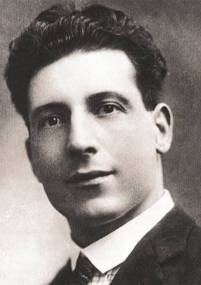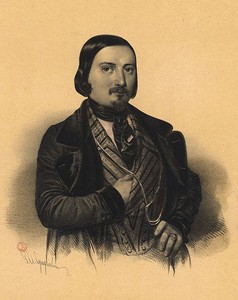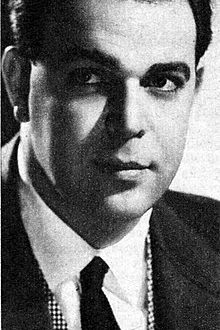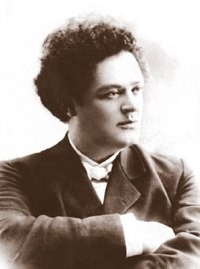
Video Pinza (Ezio Pinza) |
Ezio Pinza

Pinza is the first Italian bass of the XNUMXth century. He easily coped with all technical difficulties, impressing with magnificent bel canto, musicality and delicate taste.
Ezio Fortunio Pinza was born on May 18, 1892 in Rome, the son of a carpenter. In search of work, Ezio’s parents moved to Ravenna shortly after his birth. Already at the age of eight, the boy began to help his father. But at the same time, the father did not want to see his son continue his work – he dreamed that Ezio would become a singer.
But dreams are dreams, and after the loss of his father’s job, Ezio had to leave school. Now he supported his family as much as he could. By the age of eighteen, Ezio showed a talent for cycling: in one major competition in Ravenna, he took second place. Maybe Pinza accepted a lucrative two-year contract, but his father continued to believe that Ezio’s vocation was singing. Even the verdict of the best Bolognese teacher-vocalist Alessandro Vezzani did not cool the elder Pinza. He said bluntly: “This boy has no voice.”
Cesare Pinza immediately insisted on a test with another teacher in Bologna – Ruzza. This time, the results of the audition were more satisfactory, and Ruzza began classes with Ezio. Without giving up carpentry, Pinza quickly achieved good results in vocal art. Moreover, after Ruzza, due to a progressive illness, could not continue to teach him, Ezio won the favor of Vezzani. He did not even understand that the young singer who came to him was once rejected by him. After Pinza sang an aria from the opera “Simon Boccanegra” by Verdi, the venerable teacher did not skimp on praise. He not only agreed to accept Ezio among his students, but also recommended him to the Bologna Conservatory. Moreover, since the future artist did not have the money to pay for his studies, Vezzani agreed to pay him a “stipend” from his own funds.
At twenty-two, Pinza becomes a soloist with a small opera troupe. He makes his debut in the role of Oroveso (“Norma” Bellini), a rather responsible role, on stage in Sancino, near Milan. Having achieved success, Ezio fixes him in Prato (“Ernani” by Verdi and “Manon Lescaut” by Puccini), Bologna (“La Sonnambula” by Bellini), Ravenna (“Favorite” by Donizetti).
The First World War interrupted the rapid rise of the young singer – he spends four years in the army.
Only after the end of the war did Pinza return to singing. In 1919, the directorate of the Rome Opera accepts the vocalist as part of the theater troupe. And although Pinza plays mostly secondary roles, he also shows an outstanding talent in them. This did not go unnoticed by the famous conductor Tullio Serafin, who invited Pinza to the Turin Opera House. Having sung several central bass parts here, the singer decides to storm the “main citadel” – Milan’s “La Scala”.
The great conductor Arturo Toscanini was preparing Wagner’s Die Meistersinger at the time. The conductor liked the way Pinz played the part of Pogner.
Becoming a soloist at La Scala, later, under the direction of Toscanini, Pinza sang in Lucia di Lammermoor, Aida, Tristan and Isolde, Boris Godunov (Pimen) and other operas. In May 1924, Pinza, together with the best singers of La Scala, sang at the premiere of Boito’s opera Nero, which aroused great interest in the musical world.
“Joint performances with Toscanini were a true school of the highest skill for the singer: they gave the artist a lot to understand the style of various works, to achieve unity of music and words in his performance, helped to fully master the technical side of vocal art,” says V.V. Timokhin. Pinza was among the few whom Toscanini saw fit to mention. Once, at a rehearsal of Boris Godunov, he said about Pints, who played the role of Pimen: “Finally, we found a singer who can sing!”
For three years, the artist performed on the stage of La Scala. Soon both Europe and America knew that Pinza was one of the most gifted basses in the history of Italian opera.
The first tour abroad Pinza spends in Paris, and in 1925 the artist sings at the Colon Theater in Buenos Aires. A year later, in November, Pinza will make his debut in Spontini’s Vestal at the Metropolitan Opera.
For more than twenty years, Pintsa remained the permanent soloist of the theater and decoration of the troupe. But not only in opera performances did Pinz admire the most demanding connoisseurs. He also performed successfully as a soloist with many of the most prominent US symphony orchestras.
V.V. Timokhin writes: “Pintsa’s voice – a high bass, somewhat baritone character, very beautiful, flexible and strong, with a large range – served the artist as an important means, along with thoughtful and temperamental acting, to create life, truthful stage images. A rich arsenal of expressive means, both vocal and dramatic, the singer used with genuine virtuosity. Whether the role required tragic pathos, caustic sarcasm, majestic simplicity or subtle humor, he always found the right tone and bright colors. In the interpretation of Pinza, even some far from central characters acquired special significance and meaning. The artist knew how to endow them with living human characters and therefore inevitably attracted the close attention of the audience to his heroes, showing amazing examples of the art of reincarnation. No wonder art criticism of the 20s and 30s called him “the young Chaliapin.”
Pinza liked to repeat that there are three types of opera singers: those who do not play on stage at all, who can only imitate and copy other people’s samples, and, finally, those who strive to comprehend and perform the role in their own way. Only the latter, according to Pinza, deserve to be called artists.
Pinz the vocalist, a typical basso cantante, was attracted by his fluent voice, refined technical skill, elegant phrasing and peculiar grace, which made him inimitable in Mozart’s operas. At the same time, the singer’s voice could sound courageous and passionate, with the utmost expression. As an Italian by nationality, Pince was closest to the Italian operatic repertoire, but the artist also performed a lot in operas by Russian, German and French composers.
Contemporaries saw Pinz as an exceptionally versatile opera artist: his repertoire included over 80 compositions. His best roles are recognized as Don Juan, Figaro (“The Wedding of Figaro”), Boris Godunov and Mephistopheles (“Faust”).
In the part of Figaro, Pinza managed to convey all the beauty of Mozart’s music. His Figaro is light and cheerful, witty and inventive, distinguished by sincerity of feelings and unbridled optimism.
With particular success, he performed in the operas “Don Giovanni” and “The Marriage of Figaro” conducted by Bruno Walter during the famous Mozart Festival (1937) in the composer’s homeland – in Salzburg. Since then, here every singer in the roles of Don Giovanni and Figaro has been invariably compared to Pinza.
The singer always treated the performance of Boris Godunov with great responsibility. Back in 1925, in Mantua, Pinza sang the part of Boris for the first time. But he was able to learn all the secrets of Mussorgsky’s brilliant creation by participating in productions of Boris Godunov at the Metropolitan (in the role of Pimen) together with the great Chaliapin.
I must say that Fedor Ivanovich treated his Italian colleague well. After one of the performances, he hugged Pinza tightly and said: “I really like your Pimen, Ezio.” Chaliapin did not know then that Pinza would become his original heir. In the spring of 1929, Fedor Ivanovich left the Metropolitan, and the show of Boris Godunov stopped. Only ten years later the performance was resumed, and Pinza played the main role in it.
“In the process of working on the image, he carefully studied materials on Russian history dating back to the reign of Godunov, the biography of the composer, as well as all the facts related to the creation of the work. The singer’s interpretation was not inherent in the grandiose scope of Chaliapin’s interpretation – in the performance of the artist, lyricism and softness were in the foreground. Nevertheless, critics considered the role of Tsar Boris to be the biggest achievement of Pinza, and in this part he had a brilliant success, ”writes V.V. Timokhin.
Before World War II, Pinza performed extensively at the Chicago and San Francisco opera houses, toured England, Sweden, Czechoslovakia, and in 1936 visited Australia.
After the war, in 1947, he briefly sang with his daughter Claudia, the owner of a lyric soprano. In the 1947/48 season, he sings for the last time at the Metropolitan. In May 1948, with the performance of Don Juan in the American city of Cleveland, he said goodbye to the opera stage.
However, the singer’s concerts, his radio and television performances are still an incredible success. Pinza managed to achieve the hitherto impossible – to gather twenty-seven thousand people in one evening on the New York outdoor stage “Lewison Stage”!
Since 1949, Pinza has been singing in operettas (Southern Ocean by Richard Rogers and Oscar Hammerstein, Fanny by Harold Rome), acting in films (Mr. Imperium (1950), Carnegie Hall (1951), This Evening we sing” (1951).
Due to heart disease, the artist withdrew from public performances in the summer of 1956.
Pinza died on May 9, 1957 in Stamford (USA).





